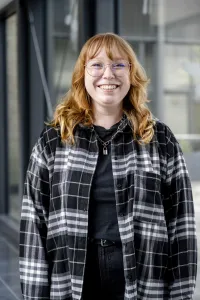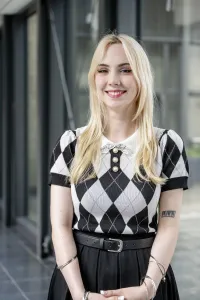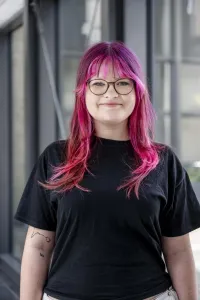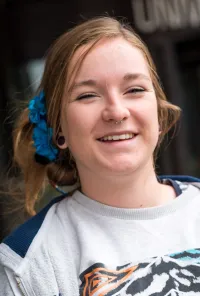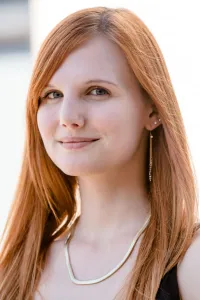Wieso haben Sie sich damals für Ihr Studienfach entschieden?
I was very interested in East Asian culture for many years before I started my studies and also enjoyed learning new languages. Especially those that are difficult to learn and unusual for native German speakers. My aunt once gave me the hint that you can also study this and a good friend of mine is also studying Korean Studies. As a result, my desire to pursue a degree in Korean Studies grew stronger and stronger. Even though the idea of studying Korean Studies once arose from an interest in K-pop, as it did for many people, it always remained, even in times when I was less interested in K-pop etc.
An welchen Stellen haben sich die Erwartungen an Ihr Studienfach erfüllt, an welchen nicht?
You learn the language much faster than I thought, which surprised me in a positive way. I learn languages quickly and really enjoy it and even if it was a bit overwhelming at times, the lessons really help you to understand and apply everything. After the first semester, I looked back and was really surprised by my own abilities. It's very different to language lessons at school, because there's simply no ‘We have to do this according to the syllabus, we just don't have enough time’ and the lecturers are noticeably competent with a lot of experience and really know what they're doing. What I had already anticipated, however, is that you will find lots of people with similar interests and goals, especially as it is a small degree programme. In addition, the OAW student council at RUB offers many opportunities to get to know other people who are not directly involved in your courses and to gather information about your own degree programme.
Was macht Ihnen in Ihrem Fach am meisten Spaß?
What I enjoy most are the little moments of success that come from learning. When you finally have a vocabulary word down, a dialogue is suddenly fluent or you can remember all irregular verbs at once without any problems when you're doing a task. Apart from that, it's definitely the lessons themselves that are so much fun. You will be well prepared for everything and you almost always feel like a small team thanks to the partner work and you can help each other with small gaps. In addition, the subject matter is always explained and taught so well that questions rarely arise (which are of course answered).
Was war bisher die größte Herausforderung?
The biggest challenge was to keep up with the lessons, even when I was less motivated, and to commit to content that was more difficult to learn, such as Hanja (Chinese characters used in the Korean language), which was completely new to me, or which dynasty colonised whom and when, but somewhere along the line you get used to it. In a way, it's also the pressure you're under, as Korean Studies is only offered in the winter semester. So if you don't pass the semester exam and the re-sit exam, you have to wait a whole semester to repeat the semester if necessary. However, the exam is easy to pass if you have attended classes and studied, but it is a little intimidating, especially the first time. The thought that nobody wants you to fail the exam helped me a lot here.
Was wollen Sie einmal damit werden?
This question is often asked by relatives or friends, and of course it is justified. Korean Studies is an unconventional degree programme and doesn't work towards a fixed profession like teaching, for example. I have a lot of general ideas, my favourite would be to do something in the field of translation or journalism. However, what was much more important to me was to study something that I really enjoy and that is my passion. That's why I personally don't have a specific profession that I'm working towards, at least at the moment.
Welche Tipps geben Sie den Leuten, die auch überlegen, Ihr Fach zu studieren?
I think it's important to be aware of how demanding the degree programme is. Especially if you are new to the subject, it can seem like studying Korean Studies is not a serious endeavour. However, there is actually a lot of personal work and commitment behind the scenes. It does settle down over time and you find your routine, but it really is something to be taken seriously and not something you can study on the side. I would recommend taking Hanja seriously right from the start and memorising the associated radicals. You should also take attendance seriously. At the beginning I thought that this might be a bit excessive, but I quickly realised that even if you are absent just once, you notice how much you have to work on and then prepare again. That sounded almost pessimistic, but it can all be done if you really want it!
